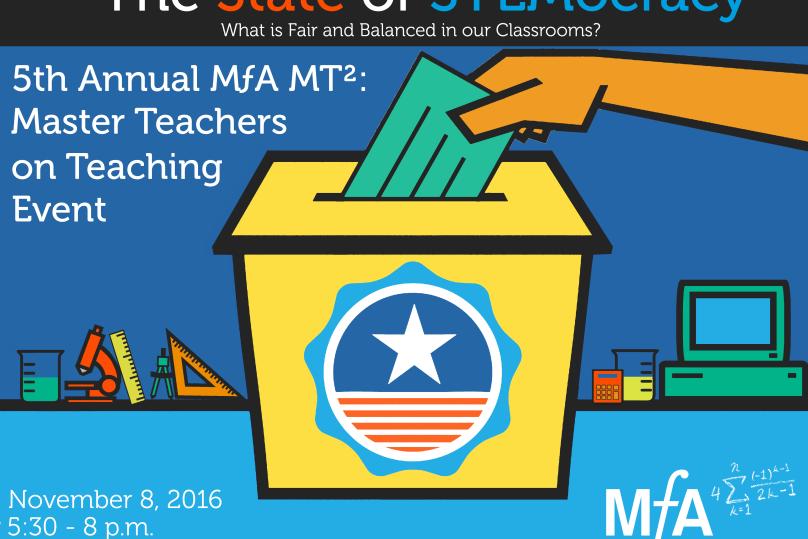
MT²: Master Teachers on Teaching is a special event held once a year where MƒA Master Teachers prepare and deliver TED-style presentations to the greater MƒA community, sharing ideas, experiences, and stories from their classrooms. The 5th Annual MT², held on November 8, 2016, featured nine MƒA Master Teachers who explored our Election Day theme, The State of STEMocracy, looking at what is fair and balanced in the classroom.
Shannon Guglielmo
As an educator, MƒA Master Teacher Shannon Guglielmo has always been encouraged to engage her students with content that relates to the real-world. But what if the students were engaged by also shaping curriculum and planning for projects? In this talk, Shannon highlights how she connects graph theory to something New York City students interact with every day – the subway system.
Alexander Dvorak
How do teachers best serve newly-arrived immigrant students with various schooling backgrounds and literacy in STEM classroom? Get them reading! MƒA Master Teacher Alexander Dvorak speaks about how incorporating more opportunities for reading into his biology class leads to more student inspiration – especially when it comes to science.
Adam Zaid
What’s a “fair” election? MƒA Master Teacher Adam Zaid brings an important vote to his classroom – what will the toppings be at their Ice Cream Sundae party? – in an effort to explore the math behind different voting styles. Is there an election system that is the fairest? Is there a universal “best” voting style? And which topping will win?
Marcelle Good
So much of equity and fairness in the classroom is based on the idea of meeting students where they are, yet teachers are so often pulled between giving students what they think they need and the drive to cover grade-level material. In her talk, MƒA Master Teacher Marcelle Good explores the tension of addressing what’s student-appropriate with what’s grade-level appropriate in her classroom.
Andrew Wille
Is there a Zeno’s Paradox for logical argument? It may be tempting to think that fairness can be attained through strict adherence to a set of logical rules, but is that true? MƒA Master Teacher Andrew Wille explores an assertion that logical rules, mathematical axioms, and scientific theories are not, in themselves, fair and balanced, and that determining the fairness of them is part of an infinite process.
Marvin Antebi-Gruszka
Do students find it difficult to admit to their lack of knowledge or mastery in class? How can confusion become inspirational? MƒA Master Teacher Marvin Antebi-Gruszka looks at various ways to turn a student’s “I don’t know,” into a moment that makes students feel empowered and in charge of their learning.
Stacy Goldstein
Is it possible to engage students in group work while still achieving mastery of content? MƒA Master Teacher Stacy Goldstein highlights how active learning and POGIL (Process Oriented Guided Inquiry Learning) in the chemistry classroom can lead to an environment of discovery and risk-taking in learning.
Derek Dubossi
High-stakes tests can be beneficial for various reasons, but can also bring out some less-than-desirable practices in the classroom - like motivating students with grades and teaching to the test. MƒA Master Teacher Derek Dubossi shows how using controversial economic and political topics in science as a teaching tool helps shift motivations for learning away from grades and points to a bigger desire to affect change.
Vielca Anglin
The movement to increase student competency in STEM and drive students to STEM-focused careers can often translate to academic frustration. Through her experience at a non-traditional transfer school, MƒA Master Teacher Vielca Anglin has been able to marry STEM topics with the design-thinking process in a way that empowers and excites students. She focuses on how considering the diversity of how students learn can set a foundation for empathy and democratization of classrooms.